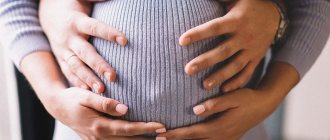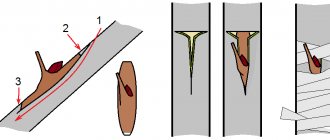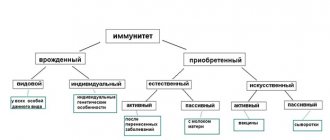How does the vaccine affect fertility?
Currently, the website of Rospotrebnadzor states: “Russian vaccines against COVID-19 have passed the necessary tests to assess the effect on offspring.
No negative consequences were identified." The Russian Ministry of Health also talks about the safety of vaccines for fertility. Patients can discuss any doubts or concerns regarding risks with their doctor.
Home > Information for parents > Vaccination > vaccination throughout life
Vaccination during
pregnancy Mandatory
for a woman expecting a child is seasonal
influenza vaccination, which, in accordance with the national vaccination calendar
, is carried out in the 2nd and 3rd trimester, starting from the 13th week of pregnancy. In exceptional cases, if there is an increased risk of developing post-influenza complications, vaccination is recommended regardless of the stage of pregnancy. To prevent the disease, drugs that do not contain merthiolate are used from September to February.
In a number of developed countries, such as the USA, Great Britain, Australia, Israel, etc., mandatory vaccination of pregnant women against whooping cough, diphtheria, and tetanus
starting from 28 weeks of pregnancy. For this purpose, an acellular vaccine with a reduced amount of diphtheria toxoid is used to develop stable immunity and minimize post-vaccination reactions. This helps protect both the pregnant woman herself and the newborn baby, who is vulnerable to the severe course of these infections, which in 60-90% of cases lead to death or serious complications in babies in the first six months of life who have not yet had time to fully receive the DTP vaccine.
post-exposure rabies prophylaxis if necessary.
rabies vaccine in combination with immunoglobulin.
According to indications, in conditions of high risk of infection, immunization against viral hepatitis B is allowed
vaccine without merthiolate, pregnant women at risk of infection (direct contact with the carrier, HIV infected).
!!! During pregnancy, administration of live vaccines is prohibited.
. However, if a woman did not know about the pregnancy and was vaccinated, this should not be the reason for its premature termination. In case of contact with a sick, for example, measles, pregnant woman who has not been sick and has not been vaccinated, immunoprophylaxis can be carried out using replacement immunoglobulin and is considered in each individual case.
Given the high risk of infection, immunization with inactivated vaccines is possible
against meningococcus, pneumococcus, hepatitis A, typhoid fever, yellow fever.
For example, women suffering from bronchopulmonary diseases (bronchial asthma, COPD, smokers) are recommended to be vaccinated against pneumococcal infection and whooping cough. Travelers to endemic regions may need to be immunized against meningococcal disease, hepatitis A, and if there is a high risk of contracting typhoid fever or yellow fever, an appropriate vaccination will be required. Each case must be considered individually.
Do I need to be vaccinated before pregnancy or IVF?
According to studies, no negative effects of the vaccine on reproductive function have been identified. However, whether to get vaccinated or not is everyone’s voluntary decision. Our clinic performs IVF treatment programs for NON-vaccinated patients. At the moment, there are no legal restrictions in this regard.
Since there is no data on a more severe course of the disease in pregnant women and a rare incidence of transmission of infection from mother to fetus, not a single professional association of obstetricians and gynecologists recommends postponing planning pregnancy and childbirth for the post-Covid period.
Vaccination during pregnancy
Table of contents
- Do I need to get vaccinated during pregnancy?
- Can side effects occur after vaccination during pregnancy?
- Advantages of contacting MEDSI
For about two years now, the world has been actively fighting the new coronavirus infection.
All this time, research is being conducted, new drugs, treatment regimens and vaccines are being created. There is progress. At the moment, several vaccines have already been created that are designed to protect people from a dangerous disease. Unfortunately, not everyone could be given special drugs at first. The group of people who were not vaccinated included children, women expecting to give birth and people with certain medical conditions. Currently, a number of countries around the world require mandatory vaccination after 12 weeks of pregnancy.
What is the situation in Russia? Can pregnant women be vaccinated against coronavirus? Which vaccine should I use? Let's consider all aspects of these issues and understand the possible side effects.
Do I need to get vaccinated during pregnancy?
A number of countries (including Russia) leave the right of choice to the patient herself.
The latest clinical guidelines report allowing vaccination during pregnancy with Sputnik V. Vaccination is possible from the 22nd week of gestation.
At the same time, the procedure becomes especially relevant for women who are at risk and suffer from:
- obesity
- diabetes mellitus
- chronic diseases of the pulmonary system
- severe liver pathologies
- cardiovascular disorders
The drug does not affect the course of pregnancy and the development of the child! At the same time, it helps preserve the health and life of both mother and fetus.
Can side effects occur after vaccination during pregnancy?
In Moscow, a group of women who are preparing to become mothers is being monitored. At the time of vaccination, they did not know that they were expecting a child. Today there are no complications.
This allows us to say that in the near future, most likely, it will be possible to administer vaccinations at earlier (up to 22 weeks) dates.
Some women refuse the procedure at the planning stage.
This approach is wrong. You should also be vaccinated when preparing for pregnancy, since complications caused by coronavirus infection can have a negative impact on pregnancy and the patient’s condition. It is necessary to take into account the fact that immunity takes 3 months to develop. You need to wait this time after vaccination, and then calmly plan your pregnancy. The studies did not notice any negative impact of the vaccine on the reproductive potential of both sexes. Meanwhile, the coronavirus itself can have an aggressive effect on oogenesis and spermatogenesis. It is caused by elevated temperature during the disease, while eggs and sperm die. However, a slight one-day increase in temperature after vaccination does not affect pregnancy. This is due to the fact that it is not a consequence of infection, but of the administration of the drug.
Important! Currently, vaccination is not carried out during breastfeeding.
Advantages of contacting MEDSI
- Experienced specialists.
Vaccination against covid (coronavirus) during pregnancy is carried out by paramedical personnel (nurses) with the necessary knowledge and skills - Diagnostic capabilities.
Before vaccination, you can perform a rapid test for the coronavirus antigen (smear) or a PCR test to detect the RNA of the virus (smear), as well as a study of the level of IgG antibodies to the spike protein of the SARs CoV-2 virus - Possibility for administration of two drugs.
Immunization can be carried out with the Sputnik V and Sputnik Light vaccines - Immunization preparation program.
It includes an examination by a doctor before the administration of each component of the vaccine, a rapid test for COVID-19, vaccination (1-2 doses) and two telemedicine consultations in the SmartMed application - Mandatory preliminary consultation with a doctor.
He will talk about coronavirus vaccination for pregnant women, answer the question of whether you can be vaccinated (if you have certain diseases), report on the indications and identify contraindications (if any) - Comfortable conditions for the procedure.
Vaccination is carried out without queues or long waits, on a convenient day. To undergo the procedure, each patient can choose the clinic closest to them. - Transfer of vaccination data and their availability on the government services portal.
Our specialists ensure data transfer to a special register to receive a QR code
If you want to clarify the specifics of coronavirus vaccination for pregnant women or sign up for vaccination, call +7 (495) 7-800-500. Our specialist will answer all questions. You can also register for a clinic using the SmartMed application.
How much time should pass between vaccination and conception/IVF program?
Women are recommended to begin IVF treatment programs or attempts to conceive on their own no earlier than 30 days AFTER receiving the 2nd component of the vaccine. As a rule, after 2-3 weeks the acute immune process, the response to the vaccine, stops, and immunity begins to form in the body.
Men can donate sperm for IVF 3-5 days after ANY component of the vaccine. However, there is still very little statistical data on the effect of the vaccine on spermatogenesis. It is possible to pre-freeze the sperm BEFORE vaccination; this procedure takes a little time and will allow vaccination to be completed in a timely manner.
Pregnancy and vaccination: expert opinions and stories of expectant mothers
Russian scientists have debunked another myth about the coronavirus vaccine. The leading Russian center of obstetrics and gynecology, named after Kulakov, has proven that vaccination does not affect the reproductive function of both women and men, but it reduces the risks during pregnancy.
The doctor calls the baby’s heart rhythm joyful, stating that she and her mother are in the same high spirits. This is Anastasia’s first pregnancy; it was carefully planned, and these plans included vaccination against coronavirus. The girl found out that there would be a child a week after she received the second component of Sputnik.
“I have even more strength than before pregnancy. We passed the first perinatal screening and the second, there were no concerns on the part of the fetus. As the doctor told us, everything is fine,” said Anastasia Nitchenko.
The Kulakov National Center for Obstetrics, Gynecology and Perinatology was the first in the country to begin researching how the vaccine affects reproductive health. Its participants are 200 women from 18 to 49 years old and 150 men under 60 years old. All were vaccinated with Sputnik V. The level of hormones and the quality of their germ cells are monitored for more than six months, comparing the indicators before and after vaccination, checking whether there is any delayed effect of Sputnik. According to published data, everyone developed antibodies to the virus, but the vaccination did not in any way affect the ability to have children. Neither in women, including after 37 years of age, which is considered late reproductive age, nor in men.
“We did not notice an increase in the titer of autoimmune antibodies. Because the idea, the hypothesis of the study was that if the vaccine has a negative effect, it can do so through autoimmune genesis. That is, when the body produces antibodies to its own tissues and organs, including reproductive organs,” explained Deputy Director, Head of the Department of Scientific Activities of the National Medical Research Center of Obstetrics and Gynecology, Perinatology. Kulakova Natalia Dolgushina.
“The disease itself and especially vaccination have become surrounded by an incredible trail of various so-called news. The main conclusion, obviously, should be this: at present, the project aimed at studying the effect of vaccines on the function of the reproductive system has not shown negative results,” said the director of the National Medical Research Center for Obstetrics and Gynecology, Perinatology. Kulakova Gennady Sukhikh.
The results of another study were published today by another group of Russian scientists. Vaccination against coronavirus during pregnancy does not harm either the mother or the child, but on the contrary, reduces the risks. This is confirmed by the findings of the world's leading professional communities, including the World Health Organization. The study was conducted in Moscow, at the Filatov Hospital. It turned out that pregnant women diagnosed with COVID-19 have a higher risk of premature birth. However, it may not come to birth.
“We know that last year the country lost a little over a hundred women who were in the “COVID-19 and pregnancy” line. And just imagine that more than a hundred families, mother and father did not see their daughter, their loved one did not meet her and their child. And the child, because it is not allowed often enough, is left without a mother, he will never see his mother. What other arguments should there be for pregnant women to get vaccinated,” says Gennady Sukhikh.
25-year-old Anna Petrova fell ill with COVID-19 right before giving birth. One hundred percent damage to the lungs. She had to be immediately connected to a ventilator, and Anna could not breathe on her own for 40 days. Now she understands that the doctors did the impossible to save two lives.
“It’s very disturbing to realize that I could have died. Thank you very much to the doctors that I am alive and my child is alive,” thanks Anna Petrova.
Anna has never held her son Misha, who is already two months old, in her arms. And doctors do not undertake to predict when he will finally be able to. She needs long-term rehabilitation: she will have to learn to walk again. Now Anna cannot get out of bed on her own. When asked whether to get vaccinated or not, she already answered for herself.
“As soon as I can, I will definitely do it, because, God forbid, I wouldn’t even wish it on my enemy to survive it a second time. Therefore, I would advise everyone to get vaccinated and be calm,” said Anna Petrova.
Safety for pregnant women
There are no Russian studies yet on the effect of the vaccine on pregnant women and the fetus. But, according to the operational headquarters, 100 thousand women were vaccinated when they did not yet know about their pregnancy, and none of the vaccines used had a negative effect.
Immunologist Mikhail Kostinov told “360” that you can get vaccinated against coronavirus in the second and third trimester of pregnancy, and you can get vaccinated 1.5-2 months before conception. According to him, side effects from the vaccine - such as fever and flu-like symptoms - do not affect pregnancy in any way.
The temperature that arose one day will not affect pregnancy in any way, since it did not arise due to infection, but due to the body’s reaction to the administration of the vaccine
Mikhail Kostinov.
The doctor added that before vaccination, a woman should tell her doctor about her condition. If he agrees, you can get vaccinated.
Gynecologist-reproductologist Maria Milyutina added that at the time of vaccination, the pregnant woman should feel well and be healthy. And after the vaccination, it is better for her to remain under the supervision of a doctor and not leave for another city.
“She can continue to take the prescribed vitamins, but I would caution against taking the drugs and supplements that are written about on the Internet,” the gynecologist added.
Milyutina also said that the vaccine material can reach the placenta, but not overcome its barrier. But antibodies can easily be passed on to the child. This was confirmed by Mikhail Kostinov.
“Antibodies are transmitted in the third trimester, and sometimes you can find more of them than in the mother,” added the immunologist.
Mikhail Kostin separately noted that the same situation is with antibodies after a flu shot, which can protect both mother and child in the first months. Among other annual vaccinations that can be given to pregnant women, he highlighted vaccination against diphtheria, whooping cough and tetanus.
Can pregnant women get vaccinated?
Some experts believe that the risk to the fetus when a pregnant woman is vaccinated is rather theoretical. Can it become real? Opinions on this matter are often contradictory. Therefore, pregnant women should be vaccinated only if the risk of the disease is too high and if the infection can cause serious harm to the mother and her unborn baby.
Emergency vaccination is required when contact with the causative agent of a particular disease has occurred and the question of immediate prevention arises. It should be remembered that vaccination is effective only if it is carried out within a certain time frame (for each drug they are different).
It is believed that pregnancy is a contraindication to the administration of any live viral vaccines (against measles, mumps, rubella, chickenpox and polio), since there is a risk (albeit very small) of transmission of the weakened virus to the unborn child and the development of intrauterine pathologies. If emergency prevention of the above-mentioned infections is still necessary (for example, after close contact with a sick person), then it is recommended not to administer the vaccine, but to use ready-made antibodies (for example, immunoglobulin).
Doctors are much less categorical regarding inactivated (killed) vaccines: they are used if necessary, but with caution. In any case, if a woman becomes pregnant within the first few months after vaccination or the need for vaccination arose already during pregnancy, then in consultation with a doctor she should weigh the pros and cons. The doctor is obliged to warn her about the possible consequences of the vaccination.








